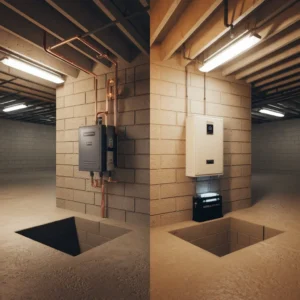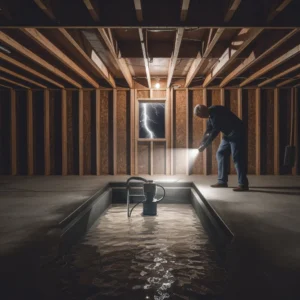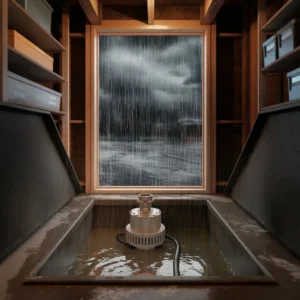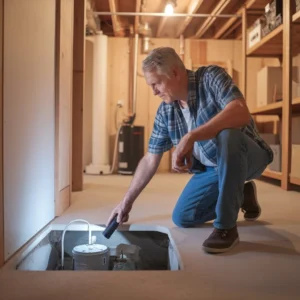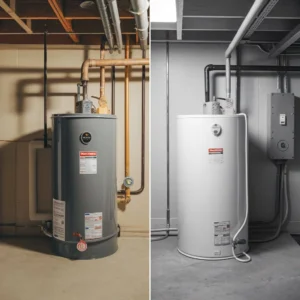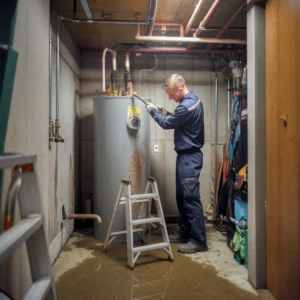Preventing clogged drains involves understanding common causes, such as buildup of food particles, grease, hair, and soap scum. Regular maintenance is essential, including using drain screens, flushing with hot water, and avoiding pouring grease down the sink. In kitchens, avoid disposing of coffee grounds in drains; in bathrooms, clean hair from drain stoppers. Additionally, natural cleaners like baking soda and vinegar can help maintain clear pipes. When these methods are not enough, professional cable cleaning for clogged drains provides an effective solution to remove stubborn blockages. Further details reveal more effective strategies.
Key Takeaways
- Use drain screens to capture debris and prevent clogs from forming in your pipes.
- Flush drains weekly with hot water and enzyme-based cleaners to maintain smooth water flow.
- Clean drain stoppers regularly and monitor water speed for early signs of blockages.
- Employ drain snakes to remove blockages and maintain clear pathways in pipes.
- Develop a personalized maintenance plan with a trusted plumber for routine drain care.
What Causes a Clogged Drain?
Clogged drains are commonly caused by a buildup of materials such as food particles, grease, hair, and soap scum, which can accumulate over time and restrict water flow.
These substances are often trapped by the design of pipes, particularly in sections where the diameter narrows or where bends occur, creating ideal conditions for blockages.
Understanding these factors is essential for identifying the root causes of drainage issues and implementing effective preventive measures.

Common Materials That Create Clogs
A primary cause of clogged drains involves the accumulation of common household materials that can obstruct water flow over time.
Grease down the drain is notorious for solidifying within pipes, leading to significant blockages. Similarly, coffee grounds should not be underestimated as they tend to accumulate and create clogs, especially when combined with other debris.
Soap scum, although appearing harmless, contributes to narrowing the pipe diameter, exacerbating potential blockages. Improper disposal of food particles can also lead to a clogged drain, particularly if these particles are not thoroughly broken down.
Toilet paper, although designed to disintegrate, can still cause issues if used excessively. Understanding these materials and their behaviors within plumbing systems is essential for maintaining efficient drain function and preventing blockages.
How Soap Scum and Hair Contribute to Drain Clogs
When examining the causes of drain clogs, it becomes evident that soap scum and hair frequently play significant roles.
In the bathroom sink, shower drain, and tub drain, soap scum forms from the reaction between soap and minerals in the water, creating a sticky residue that adheres to pipe walls. This residue can trap hair, which is a common byproduct of showering and grooming.
Together, these elements can cause a clog, restricting water flow and leading to extensive plumbing issues if not addressed.
Effective drain maintenance involves regularly cleaning your drain to remove accumulated soap scum and hair. Additionally, using hair catchers and employing proper cleaning techniques can prevent clogs, ensure a free-flowing drainage system, and reduce the need for costly repairs.
Understanding the Role of Pipe Design in Drainage Issues
Beyond soap scum and hair, the design of plumbing pipes greatly influences the likelihood of drainage issues. A well-engineered pipe design guarantees efficient flow down the drain and minimizes potential plumbing issues.
Inadequate slope or diameter of drain pipes can cause drain water to stagnate, increasing the risk of buildup. Sharp bends and turns in home plumbing may also disrupt the smooth flow, leading to a clog.
The layout of a plumbing system should facilitate unobstructed movement through drain lines to prevent blockages. Regular inspection and maintenance can alleviate these design-related challenges.
When addressing a plumbing problem, evaluating the existing pipe design is essential. Understanding these dynamics aids in both preventing and resolving clog-related plumbing issues effectively.
How Can Regular Maintenance Help Prevent Clogged Drains?
Regular maintenance is vital in preventing drain clogs by allowing for the identification of early signs of blockages, such as slow draining water or unusual odors, before they escalate into significant issues.
Implementing simple weekly and monthly maintenance habits, such as flushing drains with hot water and using enzyme-based cleaners, can effectively reduce the buildup of debris.
Employing essential tools and products like drain snakes and strainers further supports preventive care by removing potential obstructions and limiting the risk of future clogs.
Identifying Early Signs of Blockages Before They Worsen
How can homeowners recognize the early signs of drain blockages before they escalate into more severe issues? Identifying early signs, such as slow draining water, can help prevent clogged drains.
When water takes longer to disappear in a bathroom sink and tub, it may indicate a partial blockage. Ensuring the drain stopper is cleaned regularly can address minor clogs caused by soap scum or hair.
Homeowners should also check for unusual odors, which often precede significant blockages. Utilizing a drain snake periodically can clear potential obstructions, maintaining ideal flow.
Monitoring the speed at which water goes down the drain and regularly cleaning your drain stoppers are practical steps. These actions help prevent severe clogs and reduce the need for emergency interventions.
Simple Weekly and Monthly Maintenance Habits That Work
Addressing potential issues early on is only one component of preventing clogged drains. Consistent maintenance is critical.
To maintain your drains effectively, incorporate simple habits. Utilize a drain strainer to catch debris, guaranteeing minimal obstruction. Avoid putting grease and food scraps down the sink.
Weekly, pour a cup of baking soda and follow with hot water down the drain to break down buildup. Monthly, flush your drains with a bacterial drain cleaner to target organic matter.
Regular inspection and cleaning of drain stoppers are essential to prevent blockages. These practical steps can markedly reduce the occurrence of clogs.
Tools and Products to Help Keep Drains from Clogging
Effective tools and products are integral to successful preventive drain care. Using drain screens can prevent clogs in your drains by capturing debris. A drain snake is essential to remove accumulated blockages, while regular use of a bacterial drain cleaner can maintain flow without harming pipes. For a natural solution, pouring baking soda down the drain can help clear clogged drains.
| Tool/Product | Functionality |
|---|---|
| Drain Screens | Capture debris to prevent clogged drains |
| Drain Snake | Remove blockages effectively |
| Baking Soda | Natural cleaning agent to maintain flow |
| Bacterial Drain Cleaner | Decompose organic material safely |
Professional drain cleaning might involve chemical drain cleaners; however, careful use is advised to avoid pipe damage. Regular maintenance using these tools can effectively prevent clogs in your drains.
How Can You Prevent Clogs in the Kitchen Sink?
To minimize the risk of kitchen sink clogs, one should consider the use of a drain strainer to capture food debris before it enters the plumbing system effectively.
Additionally, avoiding the disposal of grease down the drain is critical, as it can solidify and adhere to pipe walls, leading to significant blockages over time.
Implementing these practices can maintain ideal water flow and prolong the functionality of the kitchen drainage system.

Using a Drain Strainer to Prevent Food Debris
Although often overlooked, a drain strainer serves as an indispensable tool in preventing food debris from causing clogs in kitchen sinks.
Positioned over the kitchen sink drain, this practical device efficiently captures food particles, preventing them from entering the plumbing system. By utilizing a drain strainer, way you can prevent food from accumulating and guarantee smooth water flow, ultimately helping to stop every drain clog before it begins.
Drain screens are available in various sizes and materials, such as stainless steel or silicone, allowing for compatibility with most sinks. Regular cleaning of the strainer is vital to maintain its effectiveness.
This simple yet effective solution greatly aids in reducing the frequency of blockages, thereby helping to prevent clogs in your drains.
Why You Should Avoid Putting Grease Down the Drain
In addition to using a drain strainer, another important practice for preventing kitchen sink clogs is avoiding the disposal of grease down the drain.
Grease, when poured into the sink drain, can cool and solidify, leading to build-up that restricts water flow. Over time, this accumulation may result in completely clogged pipes.
Clogged drains are a common issue in a home’s plumbing, often requiring costly interventions to clear the clog. To prevent such problems, it is essential to avoid pouring grease into the kitchen sink.
Instead, excess grease can be collected in a container for disposal in the trash. By following this practice, homeowners can maintain a smooth flow in their plumbing system and avert the inconvenience of a blocked sink drain.
What Are the Best Practices for Bathroom Drain Maintenance?
Effective bathroom drain maintenance involves regular removal of hair and debris from shower and tub drains using a drain cover or hair catcher.
For bathroom sinks, periodic cleaning of the pop-up stopper and flushing the drain with hot water can greatly reduce the accumulation of soap scum and toothpaste residue.
Employing these preventative measures will help maintain ideal water flow and prevent clogs.
How to Prevent Clogged in the Shower Drains
A notable factor in maintaining a clean and functional bathroom is the prevention of clogs in the shower drain. To stop clogs and keep drains clear, implement a routine maintenance strategy.
Regularly clean drain stoppers to remove hair and debris. Using drain screens is an effective method to prevent foreign particles from entering the shower drain, thereby averting drain clogs in your home. Placing a washcloth over the drain while cleaning can further trap unwanted materials.
Consistent removal of buildup will keep the bathroom drain in prime condition. Should severe blockages occur, professional drain cleaning services are advisable to guarantee thorough clearance and functionality.
This systematic approach will greatly reduce the likelihood of persistent or severe clogs in residential shower drains.
Keeping Your Bathroom Sink and Tub Clear Clogged Drains
Maintaining clear bathroom sink and tub drains involves a strategic approach similar to that used for shower drains. To guarantee ideal flow and prevent drains from clogging, regular maintenance is vital.
Begin by routinely removing debris from the drain and trap. Utilizing a stopper can help catch hair and soap scum.
Baking soda is an effective natural cleaner; periodically pour a mixture of baking soda and hot water down the drain to keep drains clear. For clogged or slow drains, this method can help dissolve minor blockages.
Common plumbing issues often arise from neglect, so implementing these tips to prevent problems is necessary. If issues persist, seeking professional plumbing services guarantees that any underlying problems are adequately addressed, maintaining a functional bathtub and sink system.
Are Baking Soda and Vinegar Effective to Clean Drain Stoppers?
For those exploring natural remedies for drain cleaning, a mixture of baking soda and vinegar offers a chemical reaction that can assist in maintaining clear pipes.
This method involves pouring one cup of baking soda followed by one cup of vinegar into the drain, allowing the reaction to break down minor blockages and residues.
Understanding the mechanics of how this combination works can help prevent clogs by regularly incorporating them into routine maintenance.
Step-by-Step Guide to Using a Cup of Baking Soda and Vinegar
Combining baking soda and vinegar can effectively clear minor drain clogs through a chemical reaction.
Begin by pouring one cup of baking soda directly into the clogged drains. This versatile cleaner works efficiently in any home, particularly targeting the kitchen sink.
Next, slowly add one cup of vinegar. The reaction between these substances will create fizzing, assisting in dislodging debris and helping keep drains clear.
Allow the mixture to sit for at least 15 minutes to maximize its efficacy. Afterward, flush the plumbing system with boiling water to guarantee any remnants are washed away.
This method is a practical approach to prevent clogs and maintain a functional plumbing system without resorting to harsh chemicals.
Understanding How This Mixture Can Help Prevent Clogs
When evaluating the efficacy of baking soda and vinegar for drain cleaning, it is essential to examine the chemical interactions that occur.
Baking soda (sodium bicarbonate) is a mild alkali that can dissolve dirt and grease. At the same time, vinegar (acetic acid) reacts with baking soda to release carbon dioxide, creating agitation that can dislodge particles.
This combination offers a natural approach to prevent drain clogs and keep your drains from clogging.
However, while it helps prevent clogs, it may not be a standalone solution for severe blockages. For enhanced effectiveness, consider using a bacterial drain cleaner to target organic buildup.
Understanding how this mixture can help is key, as well as tips on how to prevent clogs and maintain clear drains.
When Should You Consider Professional Drain Cleaning?
Signs such as persistent slow draining, recurring clogs, and unpleasant odors may indicate the need for professional drain cleaning.
Evaluating the cost and benefits of hiring experts involves considering the long-term savings from preventing further damage and ensuring efficient plumbing system operation.
Selecting a reliable plumbing service requires verifying credentials, checking customer reviews, and confirming the use of advanced cleaning techniques.
Signs That Your Plumbing System Needs Expert Attention
How can one tell when a plumbing system requires professional intervention? Several indicators necessitate expert attention.
When clogged drains persist despite basic efforts to prevent clogs, it may signify deeper issues. If a drain keeps clogging repeatedly, it is a clear sign of clogs that could benefit from a professional plumber’s expertise.
Additionally, unusual noises, such as gurgling from pipes, often indicate trapped air or blockages. Slow draining sinks and tubs can reveal underlying obstructions, while persistent odors emanating from drains suggest trapped waste or sewer gas leaks.
These symptoms warrant a thorough examination by a professional who can diagnose and address the root causes efficiently, ensuring the plumbing system operates effectively.
Evaluating the Cost and Benefits of Professional Services
Why should homeowners consider professional drain cleaning services? Clogged drains can severely disrupt the efficiency of a plumbing system, particularly in high-use areas like the kitchen sink and garbage disposal. Professional services offer thorough solutions that prevent clogs and maintain drains flowing smoothly. A detailed cost evaluation reveals that the benefits, such as prolonged plumbing system lifespan and reduced emergency repair costs, often outweigh initial expenses.
| Service Type | Cost Evaluation | Benefits |
|---|---|---|
| Basic Cleaning | Low | Reduces minor clogs, routine maintenance |
| Thorough Cleaning | Moderate | Prevents severe blockages, maintains system |
| Emergency Service | High | Immediate resolution, avoids damage |
How to Choose a Reliable Plumbing Service
Selecting a dependable plumbing service necessitates a careful evaluation of various factors to guarantee effective and long-lasting drain maintenance.
When considering professional assistance, the expertise of a plumber in identifying the root causes of a clogged kitchen sink or other drain issues is critical. Reliable services offer strategic ways to prevent clogs by addressing underlying problems ensuring your plumbing system operates efficiently.
To keep your plumbing system free from persistent issues, verify that the service employs advanced techniques that help clear obstructions and provide guidance on how to prevent clogs in your drains.
Additionally, a trustworthy provider will recommend preventive measures to take to prevent future blockages, focusing on how to prevent clogged drains in your home effectively and sustainably.

Conclusion
To summarize, preventing clogged drains is a critical aspect of home maintenance that requires a combination of regular upkeep and proactive measures. Understanding the common causes of clogs allows for targeted prevention strategies, such as installing drain screens and avoiding disposing of grease in kitchen sinks. Regular bathroom maintenance, including routine cleaning and mindful product use, reduces buildup. While DIY solutions like baking soda and vinegar offer temporary relief, professional cleaning guarantees thorough and lasting results when persistent issues arise.

